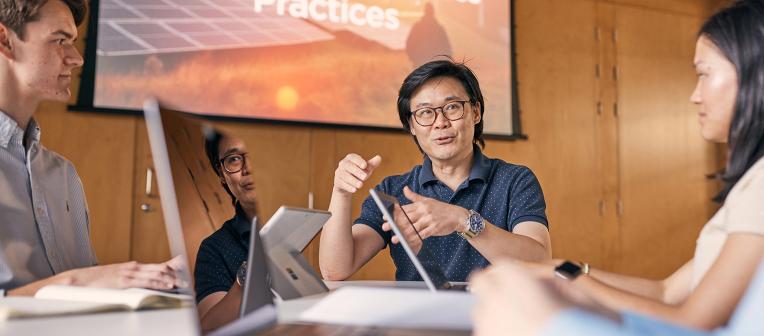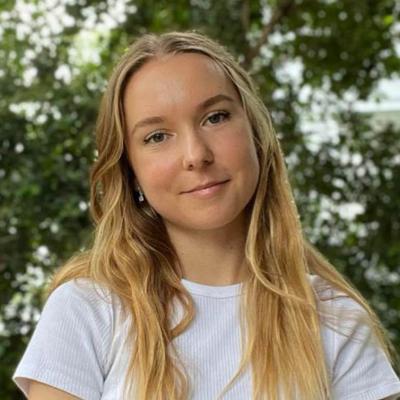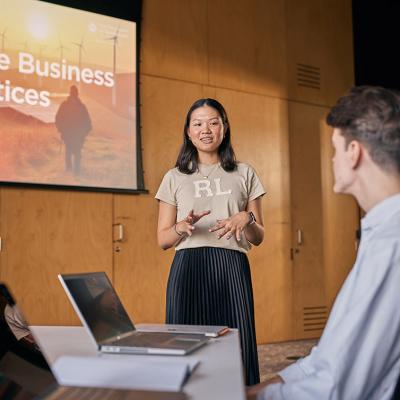Dr Terence Yeo’s passion for economics is obvious to anyone who meets him. His enthusiasm for demonstrating the relevance of economics concepts to our everyday lives is contagious. But he didn’t start his career wanting to be an economics teacher.
With a philosophy degree and a banking career in train, a significant world event drove Terence to pursue further study. This led to his current rewarding career teaching economics to undergraduate and postgraduate students at UQ.
Learn what motivated Terence to follow this path, what he enjoys about teaching, and why he believes careers in economics can create positive change in the world.
What motivated you to study economics and pursue your current career?
In high school, I studied pure science (chemistry, physics and maths), because I wanted to get into medicine. But I didn’t do well in my final exams, so pursuing medicine at uni was out.
Because I’d previously had such a focus on science, I decided to try something different. So, I enrolled in a philosophy degree.
After graduating, I worked in different banks for several years as a retail banker, selling insurance and investment products. Then I moved into relationship manager and personal banker roles.
The reason I decided to go back to university to pursue postgraduate study was because of 27 February 2007. On this day, the Shanghai Stock Exchange dropped by 9%.
That was concerning enough. But then, the next day, other stock markets around the world started falling as well.
I realised I didn’t understand how international financial markets and the global economy work. And if I wanted to remain in my career, I knew I needed to learn more.
I believed there would be professional benefits to completing a master’s degree in economics, so much so that I completed 2 master’s degrees at UQ: a Master of International Economics and Finance and a Master of Commerce majoring in Applied Finance. But personally, I was also fascinated by economics – by how broad and applicable it is to so many different things.
“Economics is endlessly fascinating to me. There’s always something new to learn.”
I later completed a PhD thesis investigating the global impact of trade wars using the Eaton and Kortum trade model (2002). Trade wars are when countries impose tariffs on imports from one another, and they affect more than the countries directly involved. This work remains relevant, for example when thinking about Trump's promise to impose high tariffs on US imports from China (and the likely reciprocal response from the Chinese government) and the fallout for other countries such as Australia.
What type of person do you think enjoys studying economics?
In my experience, people who are interested in studying economics share an intense curiosity about the world around them. They’re interested in examining the world and learning how things work and why people behave the way they do. Often, they’re also interested in social causes and want to make a positive impact on the world.
How do you believe the field of economics can create change?
Economics gives us the tools to think about how we can influence society in a preferable direction. It provides a decision-making framework to answer questions like: given limited resources, how do we choose to use our resources in a way that will make us as happy as possible?
For example, economics can help us understand significant social issues, like the housing crisis, immigration, inequality and the high rates of inflation we've been seeing recently. If you study economics, you learn why these problems are happening, which helps you think of ideas to help solve them.
Economics also opens a lot of pathways into roles that will allow you to make the impact you want.
Many graduates end up in roles where they’re able to influence policy. For example, I know colleagues and students who have ended up in the Reserve Bank of Australia (RBA) and the Australian Treasury. Others have ended up as consultants to politicians.
So, if you’re interested in making a positive impact in society, economics is something you might want to pursue.
What courses do you teach? What topics do they cover?
I’ve taught a diverse range of economics courses over the past few years. One I’m teaching now is Economics for Business. In this course, we discuss the economics of current events in Australian society. For example:
- Why is housing so expensive now in Australia? Why is it so difficult to get rental properties? Why is rent so high? This introduces discussion of simple demand and supply concepts.
- Just 2 years ago, inflation rose by 8% per annum and prices have been going up every single year since. What caused that to happen? How might the government step in to help cut inflation?
These discussions help students see how economics is applicable to topics they're interested in.
Economics for Business (ECON1011) is a core course for undergraduate commerce and business management students and a popular elective for students in other programs.
What do you enjoy most about teaching economics?
I enjoy providing students with a new set of tools and skills to look at the world and make informed decisions. They learn to think about how the motivations and objectives of organisations and individuals influence decisions and how that affects the events we see occurring around us.
I like to challenge the students in my classes by asking them to apply what they’ve learnt to a current world event to explain why it has occurred and what they can predict will likely occur in the future.
What careers for economics graduates exist?
You find economics degree holders in almost every single industry you can imagine. Literally, the sky's the limit with an economics degree.
Many of my students end up in roles where economics is the main focus of their job, like in the RBA or banking and financial industry as analysts. Others don’t, but the economics principles they’ve learned can be applied in their daily lives and are useful in their future careers, wherever they end up. This could mean job opportunities in the private sector, business world and public sectors like the Australian government.
The reason for this is because economics teaches you fundamental problem-solving and decision-making rules.
“Economics is the science of making decisions. That’s why it’s relevant to everyone.”
Discover UQ’s undergraduate economics programs or meet some other UQ academics creating positive change in their fields.







